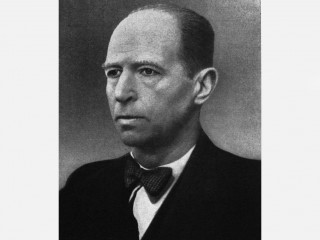
Max Volmer biography
Date of birth : 1885-05-03
Date of death : 1965-06-03
Birthplace : Hilden, Germany
Nationality : German
Category : Science and Technology
Last modified : 2010-06-01
Credited as : Physical chemist, PhD degree ,
0 votes so far
Max Volmer was born on May 3, 1885, in Hilden (Rhine country), Germany.
He studied chemistry at the University of Marburg (1905-1908) and then at the University of Leipzig (1908-1910), where he obtained a PhD degree in 1910 for his study of photochemical reactions in high vacuum.
Max Volmer became an assistant lecturer in 1912 and after Habilitation private lecturer in 1913 at the University of Leipzig. He came to Berlin in 1916 and conducted military aimed research at the Chemical Institute of of the Friedrich William University (today Humboldt University). From 1918 till 1920 Max Volmer performed chemical research in the laboratory of Auer company in Berlin.
In 1919 he invented the mercury steam ejector. Volmer became professor of physical chemistry and electrochemistry at the University of Hamburg in 1920. In 1922 Max Volmer recieved the prestigious chair of physical chemistry at the Technical University of Berlin, Charlottenburg. That chair had previously been held by the great Walther Nernst, whose work led to the third law of thermodynamics.
Later Max Volmer became a director of the Institute of Physical Chemistry and Electrochemistry. In his years in Berlin, Volmer was best known for his early contribution to models for crystal growth, both under chemical and electrochemical conditions.
Max Volmer and his student (at that time) Erdey-Gruz performed very important study of electrochemical kinetics. Together with early Butler’s results, they formed the basis of phenomenological kinetic electrochemistry. The resulting famous Butler-Volmer equation is very important in electrochemistry.
In 1945, after the World War II, the Communist government of East Germany forcibly removed Volmer to a position in Russia. However, scientists of his stature were given privileges far above those of their Russian colleagues, so that their position was described as being in a “golden cage”. Max Volmer worked in the Soviet Union in the area of atomic physics from 1945 till 1955.
In 1955 he returned to Germany and obtained a chair for physical chemistry and electrochemistry at the Humboldt University of Berlin (in the Soviet-dependent part of Germany, GDR). In 1956 Max Volmer became a president of the Academy of Sciences of the GDR, afterwards from 1958 to 1961 vice-president of the Academy of Sciences.
Max Volmer recieved an honour doctor degree of the Technical University of Berlin. The Institute of Physical Chemistry and Electrochemistry at the Technical University of Berlin was named after him “Max-Volmer-Institut”. One street in Berlin is also named after him “Max-Volmer-Strasse”.
Max Volmer retired in 1958. He died on June 3, 1965 in Potsdam, Germany.
















